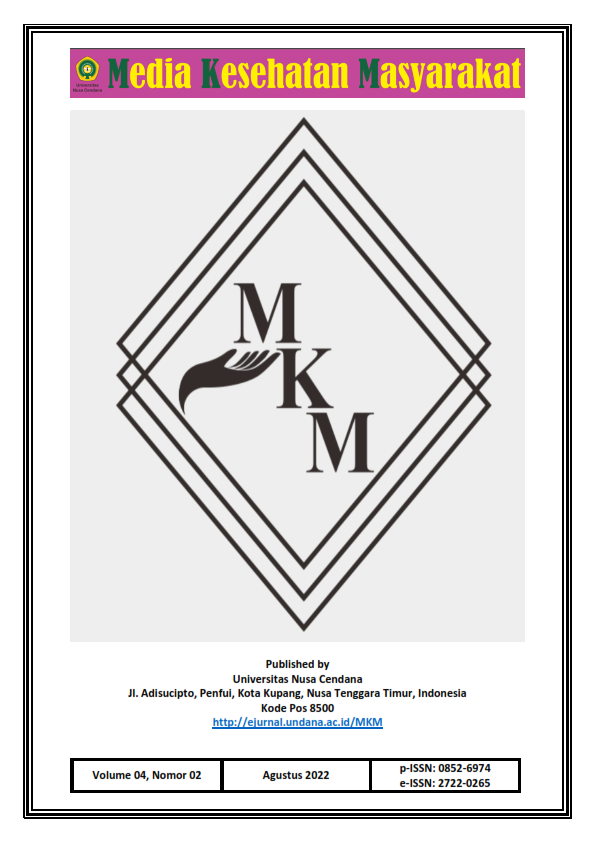Self-Concept of Homosexual Men Related to The Prevention of Risky Sexual Behavior in Kupang City
Abstract
A poor self-concept in homosexual men may increase the risk of transmission of sexually transmitted diseases, including HIV and AIDS. The purpose of the study was to describe the gay self-concept based on the aspects of knowledge, hope, and assessment. This research was qualitative with a phenomenological approach. The research informants were four gay men selected by using purposive sampling. The results showed that, based on the knowledge aspect, the informants acknowledged that homosexual behavior is a life choice influenced by genetic factors, environmental factors, and personal factors. The informants also admitted that they had been attracted to the same sex since childhood. Based on the aspect of hope, each informant has the hope of being accepted by the community while maintaining homosexual behavior, being able to marry the same sex, devoting himself to many people, especially homosexuals. Based on the assessment aspect, the informants feel proud and confident to be homosexual because they have unique talents that are different from heterosexual men. Suggestions related to this research are the need for socialization regarding the use of condoms, as well as the causes of homosexual behavior so that people do not isolate homosexuals but can guide and direct homosexuals to avoid deviant behavior such as always changing partners. In addition, it is necessary to check for sexually transmitted infections, especially in homosexual groups to prevent the transmission of HIV/AIDS.
Downloads
References
Rakhmahappin Y, Prabowo A. Kecemasan Sosial Kaum Homoseksual Gay dan Lesbian. J Ilmial Psikol Terap [Internet]. 2014;2(2):199–213. Tersedia pada: https://www.infodesign.org.br/infodesign/article/view/355%0Ahttp://www.abergo.org.br/revista/index.php/ae/article/view/731%0Ahttp://www.abergo.org.br/revista/index.php/ae/article/view/269%0Ahttp://www.abergo.org.br/revista/index.php/ae/article/view/106
Arifin G. Menikah Untuk Bahagia. Jakarta: PT. Elex Media Komputindo; 2010.
Rahman AG. Apakah LGBT (lesbian, gay, biseksual, dan transgender) merupakan fitrah atau penyimpangan? ISID Gontor; 2013.
Ilham A. Pola Komunikasi Antarpribadi Kaum Homoseksual Terhadap Komunitasnya di Kota Serang (Studi Fenomenologi Komunikasi Antarpribadi Komunitas Gay di Kota Serang Banten) [Internet]. Universitas Sultan Ageng Tirtayasa; 2012. Tersedia pada: http://kom.fisip-untirta.ac.id/
Fadhilah TS. Pasanganku Sejenisku (Studi Kasus tentang Gay yang Coming Out Kepada Orang Tua. J Bimbing dan Konseling. 2015;4(7):1–16.
Wikipedia. Pengertian Konsep Diri [Internet]. 2018 [dikutip 3 Februari 2019]. Tersedia pada: https://id.m.wikipedia.org/wiki/ Konsep_diri
Dwilaksono W, Rahardjo W. Kontrol Diri dan Perilaku Seksual Permisif pada Gay. In: PESAT (Psikologi, Ekonomi, Sastra, Arsitektur & Teknik Sipil) [Internet]. Bandung: Universitas Gunadarma; 2013. hal. 108–15. Tersedia pada: https://www.scribd.com/document/349806871/Kontrol-Diri-Dan-Perilaku-Seksual-Permisif-Pada-Gay-2013
UNAIDS. UNAIDS Data 2019 [Internet]. Jenewa, Switzerland; 2020. Tersedia pada: unaids.org
Kemenkes RI. Profil Kesehatan Indonesia Tahun 2019. Jakarta: Kementerian Kesehatan RI; 2020.
KPA Kota Kupang. Data Sekunder Jumlah Penderita HIV/AIDS Tahun 2015-September 2018. Kota Kupang; 2019.
Pambudi PS, Wijayanti DY. Hubungan Konsep Diri dengan Prestasi Akademik pada Mahasiswa Keperawatan. J Nurs Stud. 2012;1(1):149 – 156.
Notoatmodjo S. Ilmu Kesehatan Masyarakat Prinsip-Prinsip Dasar. Jakarta: Rineka Cipta; 2010.
Rola F. Hubungan Konsep Diri Dengan Motivasi Berprestasi Pada Remaja. USU Repos. 2006;1–22.
Asmara KY, Valentina TD. Konsep Diri Gay yang Coming Out. J Psikol Udayana. 2018;
Syifa V. Harapan Pemustaka Terhadap Perpustakaan Panti Sosial Karya Wanita (PSKW) Mulya Jaya Jakarta Dalam Memenuhi Kebutuhan Informasi [Internet]. Universitas Islam Negeri Syarif Hidayatullah; 2015. Tersedia pada: http://publications.lib.chalmers.se/records/fulltext/245180/245180.pdf%0Ahttps://hdl.handle.net/20.500.12380/245180%0Ahttp://dx.doi.org/10.1016/j.jsames.2011.03.003%0Ahttps://doi.org/10.1016/j.gr.2017.08.001%0Ahttp://dx.doi.org/10.1016/j.precamres.2014.12
Lestari YS. Lesbian, Gay, Biseksual, dan Transgender (LGBT) dan Hak Asasi Manusia (HAM). J Community. 2018;4(1):105–22.
Siregar N. Pengaruh Stigma Orang Dengan HIV/AIDS (ODHA) Terhadap Penerimaan Masyarakat Desa Buntu Bedimbar di Kecamatan Tanjung Morawa Kabupaten Deli Serdang. Universitas Sumatera Utara; 2012.
Kementerian Kesehatan RI. Stop Stigma dan Diskriminasi Terhadap Orang dengan Gangguan Jiwa (ODGJ). Kementrian Kesehatan Republik Indonesia. Jakarta; 2014.
Bulantika SZ. Pengaruh Persepsi Masyarakat Terhadap Kecemasan Kaum Homoseksual/Lesbian. J EDUKASI J Bimbing Konseling. 2017;3(2):158.
Huda FI. Perilaku Seksual Kaum Gay dalam Tinjauan Hukum Islam dan Perundang-Undangan di Indonesia (Studi Kasus pada Komunitas Gay di Salatiga). Institut Negeri Agama Islam Salatiga. Institut Negeri Agama Islam Salatiga; 2015.
Simanjuntak EH. Efektivitas Penyuluhan Kesehatan Reproduksi Terhadap Pengetahuan Remaja tentang Perilaku Seks Berisiko. J Kesehat Mercusuar. 2020;3(1):46–53.
Rokhmah D. Pola Asuh Dan Pembentukan Perilaku Seksual Berisiko Terhadap Hiv/Aids Pada Waria. J Kesehat Masy. 2015;11(1):125.
Wahyuni D. Peran orang tua dalam pendidikan seks bagi anak untuk mengantisipasi lgbt. J Ilm Kesejaht Sos. 2018;XIV(LGBT):23–32.
Kamila A, Suratmi T, Winidyaningsih C. Analisis Perilaku GAY dalam Upaya Pencegahan Infeksi HIV/AIDS di Kabupaten Bandung Barat Tahun 2016. J Bid ilmu Kesehat. 2017;9(1):533–42.
Satria VP. Fenomena Kasus Homoseksual Yang Terjadi Di Indonesia (Studi Kasus Tentang Gay Di Kota Magelang). Lontar Merah. 2018;1(1):38–44.
Copyright (c) 2022 Author

This work is licensed under a Creative Commons Attribution-ShareAlike 4.0 International License.

 Fransiskus Yanto Seran(1*)
Fransiskus Yanto Seran(1*)














